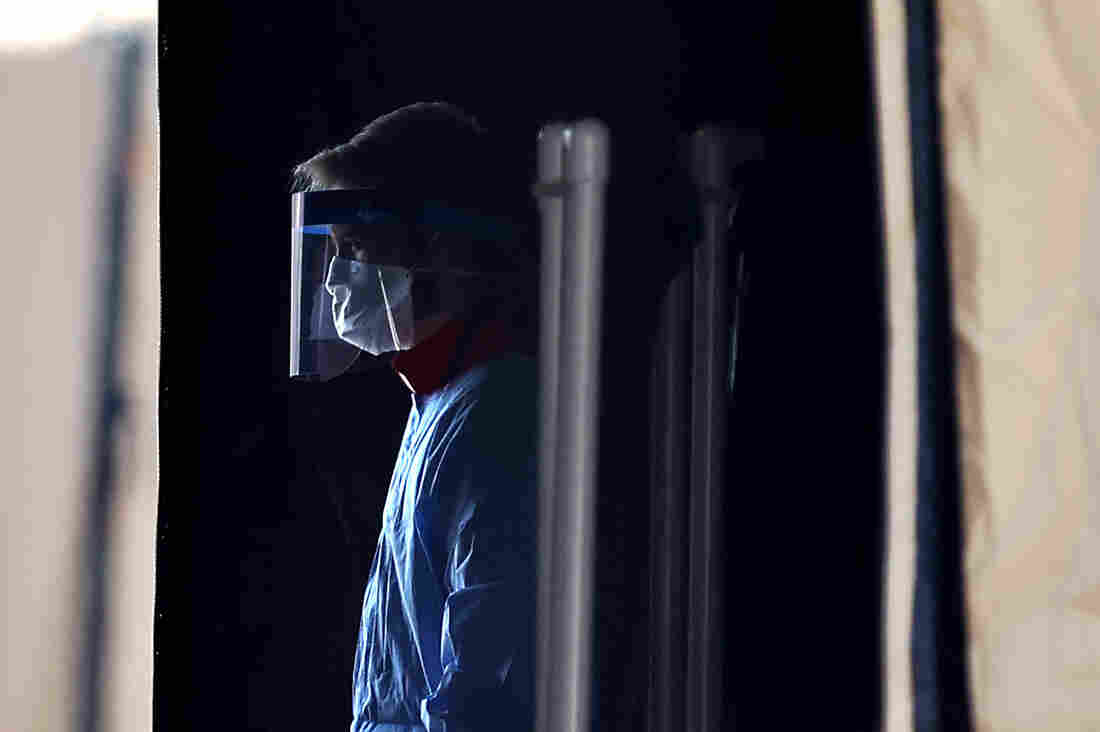
A health care worker prepares to screen people for the coronavirus at a testing site in Landover, Md., in March. Chip Somodevilla/Getty Images
New cases of coronavirus in the U.S. are climbing, and may hit peaks rivaling the summer surge. Cases are exploding in the upper Midwest and around the Great Lakes, with intensive care units approaching capacity and field hospitals being set up for overflow patients.
Health care workers in the Midwest now face some of the same nightmarish scenarios that their colleagues in New York City saw this spring.
Throughout the pandemic, these grueling experiences have taken a heavy emotional toll on health care workers — one that sometimes emerges after the storm has passed.
That's what Kimberly Johnson, a therapist in Long Beach, N.Y., has seen among health care workers she's spoken with.
"In the beginning, a lot of them were in that high-stress, high-response mode. And during that time, they may not be as active and processing what's going on or what they've been through," Johnson tells All Things Considered. "And now, months later, we're starting to see the kind of the quieting come in and [their experiences] coming back up for them."
Johnson volunteers with the Emotional PPE Project, a network of more than 450 therapists in all 50 states and the District of Columbia who provide free services to health care workers who have been impacted by the pandemic.
Here are excerpts from the interview.
Tell me what you're hearing [from your clients].
I hear a lot from those that reach out. A lot of retelling of the stories of sitting with people as they passed and doing the FaceTime messages with family. And really feeling grief and still processing the grief of those losses and the multiple losses at one time. And the problems with trying to balance what they went through there with their own family members getting sick and going into the hospital. Managing — how do you respond to a loved one, you know, going onto a ventilator when you can't even be there yourself to be supportive of them?
So that and then also the concern of, what might I be bringing home? How do I clean up, how do I come back into my family and not put my experiences back into their environment and still make home a safe place?
Do people tell you that they're burned out or are thinking of leaving the profession?
You know, I haven't heard that. Burnout is something that we will often see in people that have gone through this prolonged traumatic experience. But I don't hear people talking about leaving. The people that come to me are not necessarily talking about, "I want out."
It's, "Is what I'm experiencing normal? When will it get better? How can I help myself and my family?" It's really people looking at, how can I continue to do the work I'm doing and doing the quality of work I'm doing with this situation as it is.
How do you answer the "is what I'm experiencing normal" question when nothing about this pandemic is at all normal?
Oh, the pandemic itself isn't normal, but the human response of these medical workers, I think, is very normal. When we looked back at how people responded to other extreme events, say, like 9/11 or even Superstorm Sandy, when it hit in this area, a lot of the same symptomology emerges. Difficulty sleeping, problems with eating, problems with, you know, ruminations about what happened, issues with frustration and anger, depression. It's a lot of similarity there.
So we can speak to how what they're feeling is something we may expect to see amongst people that have dealt with these extreme stress events and then talk about different ways that they can self-care through that.
Is there anything you've heard from a client that you wish the public would be aware of?
Wear a mask. Literally, that's one of the first things that comes up often is, "Why aren't more people taking this seriously? I wish people knew what I had been through and what I saw." I can't say that's a ubiquitous thought, but it is definitely something that my patients have shared: Don't take this lightly.
Connor Donevan and Patrick Jarenwattananon produced and edited the audio interview.
"care" - Google News
October 21, 2020 at 05:51AM
https://ift.tt/3o4hj38
Health Care Workers Ask Therapist: 'Why Aren't More People Taking This Seriously?' - NPR
"care" - Google News
https://ift.tt/2N6arSB
Shoes Man Tutorial
Pos News Update
Meme Update
Korean Entertainment News
Japan News Update
Bagikan Berita Ini














0 Response to "Health Care Workers Ask Therapist: 'Why Aren't More People Taking This Seriously?' - NPR"
Post a Comment